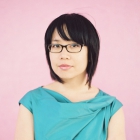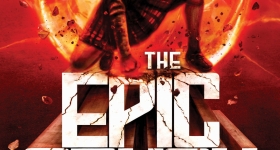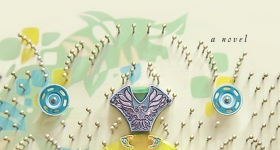Shortly after I moved to the San Francisco Bay Area from Texas, I attended a meeting about starting a new Asian American magazine. In a San Francisco apartment, seven people sat around a kitchen table, eating pizzas we had made, and discussing what we wanted to see in a magazine for our community. That evening, I met Lisa Ko, who was also a recent Bay Area transplant, from New York. As time went on, the magazine project got a name (Hyphen), I became the editor in chief, and Ko signed on as the magazine’s first books editor.
That was 15 years ago. When Ko moved back to New York, we kept in touch. I’ve known that for more than eight years, she’s been working on a novel, balancing jobs with writing during any time she could find. This month, her highly-anticipated novel, The Leavers, launched. It won the PEN/Bellweather Prize for Fiction, awarded by the author Barbara Kingsolver for a novel that addresses issues of social justice, and has been touted as a must-read on many lists.
The Leavers tells the story of Polly, an undocumented immigrant, who goes to her job one day at a nail salon and never comes home. Her bereft 11-year-old son Deming is soon adopted by a white couple who renames him Daniel. He grows up to be a directionless young man. Set in New York and China, and told from the perspective of both Daniel and Polly, Ko’s novel explores borders, belonging, and family.
Ko, the daughter of Filipino immigrants of Chinese descent, was born in Queens and raised in a mostly white town in suburban New Jersey. I talked to her about her debut novel and her writing process.
Your character Deming is adopted by a white family and grows up in a very white town. Reading about his experience made me uncomfortable.
It’s interesting. I remember being in a workshop and having a white reader say, “But this would never happen. This doesn’t feel believable to me -- that an Asian child would experience this amount of racism nowadays.”
Wow, what was your reaction?
I was thinking about the ways that Asian Americans are seen, I guess, by white Americans, and in particular, with regards to transracial adoption. I’m not saying this to criticize or generalize, but it always interested me how it seemed that many white families seemed more open to, say, adopting a child from China, or in particular a Chinese girl, rather than children of other races. What does that say about how Asian Americans are seen, and our proximity to whiteness in this country? How does anti-black racism play into that? Going back to those kinds of comments -- because of the model minority stereotype, or the ways that Asians are seen as honorary whites, even though that’s bullshit -- people don’t seem to believe that Asians experience racism that’s unique to Asian Americans.
How did you decide to write about transracial adoption?
Part of the impetus of the novel was based on a real story. There were a lot of cases I’d seen in news about eight years ago when I started working on [the novel] that were about undocumented women -- immigrants who had been deported or detained -- and their kids who are U.S.-born and were adopted by American families. … The whole story seemed so improbable and enraging, and so that was what sparked the idea. … There were these cases where the parents were being deported to, say, Central America and wanted to take their children but the U.S. courts were like, “No, they belong here. You’re an unfit parent.” And that seemed really crazy to me. Why couldn’t these parents take their kids with them? So, just this idea of separation of family, and the way that the deportation and adoption industries are linked was something I never thought about before.
Tell me about the process of working on the book. You worked on it for eight-and-a-half years, and I know you had to make financial sacrifices to make this happen.
I did many, many jobs while writing this book from adjunct teaching, to running an Airbnb hustle in my apartment, to freelance editing and writing, to working a full time office job and just writing at night or on my days off. All were helpful in different ways, trying to figure out how to balance the amount of time that, say, having a more flexible schedule can give you versus spending that free time stressing out about money. Or having an office gig that requires you to be in the office 40 hours a week, but you don’t have to worry about getting a paycheck or paying your rent or having health insurance. There’s advantages and disadvantages to both.
How many times was your novel rejected?
I didn’t send out the novel as a whole, really, until I submitted to the prize. But part of why I submitted it to the prize was I started this goal to get 50 rejections a year. And it was close to the end of the year. I was like, “I need to bump up my rejections.” [laughs] I knew the novel wasn’t totally ready. It felt like it was six months to a year out from where I felt it was ready to be sent out, but I did it on a whim.
That’s awesome. I’m starting a rejection goal too.
I never hit 50. But it always works. ’Cause the more you send out, the more you put yourself out there and the more chances there are of you getting stuff accepted.
![The Leavers: A Novel by [Ko, Lisa]](https://images-na.ssl-images-amazon.com/images/I/41gXuDCAaOL.jpg)
You wrote stories as a kid. Did you always feel like you were a writer?
I was definitely always writing since I was five. I spent a lot of time writing stories. I never showed them to anyone until high school. I was really lucky to have one or two supportive teachers who saw something in me and published my stories in the school literary magazine and even sent them out. I won this fiction contest for Sassy magazine sponsored by Always maxi pads! [laughs] There’s a lot of early encouragement on that end. But you know, the path was complicated because there was lot of self doubt and learning that it takes a lot of work. It just doesn’t take talent or the ability to write a nice sentence. It just took a long time in terms of really being able to believe in my own work and my ability to do it, and also just having to figure out how to do it.
What did you study in college?
I was an English major. I took nothing but English classes. I took a couple writing workshops. I remember being discouraged by them. I found them difficult. It was mostly white students. … I was an intern for Asian American Writers Workshop when I was 20 one summer in college and that really changed a lot of things for me in terms of seeing working Asian American writers and those gave me my first role models and writing community in a way I didn’t have in my school.
Let’s talk about that for a second, the importance of having these spaces for writers of color.
I don’t want to talk about stereotypes, but in particular for me and my family, I didn’t grow up in a family that read the New Yorker. My parents are immigrants and weren’t like, “Yes, Lisa, you should grow up to be a freelance writer and write short stories for a living.” So part of my own self doubt was being, “Is this possible? Is this responsible? Am I letting down my ancestors?” [laughs] So, finding like-minded people is huge, I think, because so much of writing is solitary. It means a lot to find people struggling through the same stuff, or having the same experiences when you don’t normally get to see that. For instance, at VONA (Voices of our Nations Arts Foundation), you start from that ground of having writers of color and Asian American readers and writers centered, rather than having white readers and writers, which was really transformative.
You know how people say that you have to write every day, even if you just sit down for 30 minutes? Do you find that to be true? I feel like it produces a lot of crap. I don’t know if it’s helpful. I’m just wondering: what works for you?
That’s a good question. I think everybody’s different and you have to find what works for you. Like, I feel like I’m definitely an over-writer, as in my process is producing a ton of crap and then deleting it. A lot of the bulk of my work is editing for years and years. I have friends who, in an hour, can write one really good sentence. And I can write 10 pages and then delete everything but one sentence. In the end it all kind of comes out to be the same.
Do you find you have to write very day?
No, I definitely don’t write every day. I guess it depends on where I am in the process. So, finishing this novel -- that was a lot of editing. Because I’m a very to-do- list, goal-oriented person who thrives on shame [laughs], and who’s motivated by guilt and shame by my Catholic upbringing, I’d set some goal. I want to be finished with this draft by X date. Part of how it got done was really treating it like a job, which is hard when we live in a capitalist society and things that don’t make money aren’t valued. I’m going to need to put aside a few hours a week, whether it’s Saturday morning or Wednesday night or the morning of whatever to do this -- and not to compromise. For me, that was using this app to disable your wireless. Or go to a café if that works.
I know that music is really important to you. You made a playlist for the book, and music is woven throughout the book. Can you talk about the importance of that to you?
Knowing that I was different in my hometown, part of reclaiming -- or a way to have identity as empowerment -- was to define myself through music, which was a really big thing back in the ’80s before the Internet. Also, finding solace in what was back then called alternative music and art provided this way out. And also, I think a lot about mixtapes and music as being similar in so many ways to writing. Like those early mixtapes that my friends and I made -- you made them to evoke an emotional reaction, right? I remember being really conscious about what I put in the beginning and what would be track seven and balancing out a fast one and a slow one. That’s sort of what any writer does. You arrange scenes or paragraphs to produce a certain emotion in the reader. There’s sort of similarity in that.
I still have all my mixtapes.
Me too.
The Leavers was released on May 2. Ko will be on a book tour in May and June, visiting Nashville, TN; the San Francisco Bay Area; Seattle; Pasadena, CA; Portland, OR; Chicago; Milwaukee; and Minneapolis.










Comments